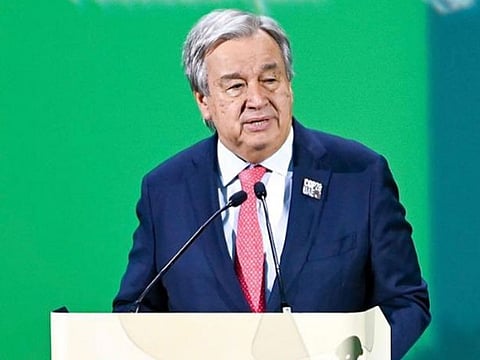G77 summit at COP28 UAE: UN chief Antonio Guterres proposes Climate Solidarity Pact
Al Jaber vows to work with G77 to deliver results for Global South

Dubai: The Group of 77 and China Leaders Summit at COP28 is a first at the UN Climate Conference. UAE President His Highness Sheikh Mohamed bin Zayed Al Nahyan welcomed the leaders at the Expo City in Dubai and expressed the nation’s commitment to enhancing global cooperation to achieve the ambitious goals set for COP28, WAM news agency reported.
Addressing the G77 leaders, COP28 President Dr Sultan Al Jaber pledged to leave no stone unturned to deliver the summit’s outcomes. He said: I will give everything to deliver what the world really needs. But I need your help. I need you to step up. I need you to unite, and I need you to work together.”
He promised to work with the G77 to ensure this is a COP of action that will deliver results for the Global South. “I will push for action at every turn, and I will not hold anything back. That means action to restore trust across the board, and action to close the gap on every track, whether it’s mitigation, adaption and means of implementation, including finance,” he added.
UN chief’s proposal to cut emissions
UN Secretary-General Antonio Guterres proposed a Climate Solidarity Pact where big emitters make extra efforts to cut emissions, and developed countries mobilise resources to help emerging economies rein in emissions.
Admitting that climate challenges keep growing, he told the summit that crushing debt burdens hamper efforts of many countries to reduce emissions and protect people from extreme weather, creating a paradox.
To overcome that, the Global Stocktake must create the conditions for increased climate ambition in 2025 and beyond, Guterres said, adding that it requires action in three areas.
“Developed countries must clarify the delivery of the $100 billion commitment. We need also to see a clear plan to double adaptation finance to $40 billion a year by 2025. The international financial system must provide an effective debt-relief mechanism,” Guterres said.
Stressing the need to reduce emissions drastically, he said, “We need a just, fair and equitable transition from fossil fuels to renewables. COP28 must commit countries to triple renewables capacity, double energy efficiency, and bring clean energy to all, by 2030.”
How collaboration will help
Guterres also called on COP to strengthen international cooperation on climate. “We need collaboration between governments and between countries and companies: to align all critical emitting sectors with 1.5 degrees; to put a fair price on carbon; to protect everyone on earth with an effective early warning system, and to support the global transition to net zero by 2050,” he added.
Sri Lankan President Ranil Wickremesinghe sought to link climate mitigation with economic resources.
He told the leaders that debt relief is the biggest issue for many countries. “It’s not possible to deal with climate crisis when they are facing debt relief. And there’s no specific references on debt in COP,” he said.
Why climate finance is vital
Barbados Prime Minister Mia Amor Mottley, a prominent advocate for climate finance equity, issued a stark, characterising soaring global temperatures as a potential “death sentence for many.”
Mottley stressed the urgent need for concrete actions, particularly in regulating methane emissions, and urged accountability in the oil and gas sector.
She also called for a crucial shift in attitudes towards climate funding, emphasising the need for long-term capital to avoid compromising between people and the planet.
Sign up for the Daily Briefing
Get the latest news and updates straight to your inbox







